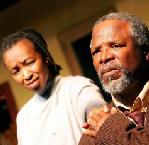SITE GUIDE
SEARCH
REVIEWS
FEATURES
NEWS
Etcetera and
Short Term Listings
LISTINGS
Broadway
Off-Broadway
NYC Restaurants
BOOKS and CDs
OTHER PLACES
Berkshires
London
California
New Jersey
DC
Philadelphia
Elsewhere
QUOTES
TKTS
PLAYWRIGHTS' ALBUMS
LETTERS TO EDITOR
FILM
LINKS
MISCELLANEOUS
Free Updates
Masthead
Writing for Us
A CurtainUp  London Review
London Review
 London Review
London ReviewNothing But the Truth
|
It's not about me forgiving him, it's about justice.
---- Sipho |

Motshabi Tyelele as Thando and John Kani as Sipho Makhaya
(Photo: Tristram Kenton) |
Sipho is expecting the arrival of his brother Temba's body from England where Temba, who had been a political exile under the apartheid regime, has died. Accompanying the body will be Temba's daughter, Mandisa Mackay (Rosie Motene). The impending funeral has raked up many memories from Sipho's childhood of sibling rivalry between him and Temba. Who can forget pain caused in childhood? Here it centres on a wire double decker bus, a toy lovingly made by Sipho and taken and flattened by Temba. The first shock for Sipho is that his niece arrives not with a coffin but a casket of ashes, a break with tradition that is almost too much for the old man.
The play is set against the backdrop of the "Truth and Reconciliation" hearings where in return for full confessions and a show of contrition, perpetrators of political crimes are forgiven. The process is not understood by the girl from Britain, but her cousin Mandisa explains passionately why it is important to forgive and move on. But Nothing But the Truth is a more complex play as it tackles the reconciliation needed between those black Africans who stayed behind and those who became exiles, but returned to positions of political power. And for Sipho Makhaya it is about forgiving his brother, who was favoured by their father, who was more successful with women and who became a celebrity in exile.
It is John Kani's moving performance which dominates the play. You will remember how monumental he was in The Island and be booking to see him this Spring at London's National Theatre in a revival of Siswe Banzi is Dead. His acting range is tremendous, from the cranky old man anxiously awaiting the undertaker, much to the exasperation of his long suffering daughter, sensitively played by Motshabi Tyelele, to an articulate man with passionate feelings about justice to an employee overlooked for promotion because he is considered too old. He talks about how the funeral of his own father was taken away from him and turned into a celebration by the UDF, political activists because the dead man was also the father of the exiled Comrade Temba. Some of the images of this play stay with one, like the meagre three book shelves of African writing that Sipho has lovingly nurtured and cared for in the Port Elizabeth library throughout the Apartheid political era.
The introduction of the girl from Britain, Mandisa who has taken the Westernised surname Mackay, is the child of a south African father and her mother from the Caribbean. This gives Kani the writer the opportunity to show some of the differences in attitude of the more unconventional girl brought up in Europe from those of the South African, dutiful and serious, Thando. They go head to head as Mandisa wants to see those who murdered people punished and Thando explains why this is as is. "We had a choice, a country to rebuild, a nation to take care of."
Sarah Roberts' set is full of furniture and pictures and books, the precious collection of the old man's life time assembled onstage. Janice Honeyman directs with a light hand, letting Kani set his own masterly pace.
Writing in the programme is Zakes Mda and these are his words,
"For those of us who are survivors of the past it is important that we do not forget. We owe it to future generations that what happened to us must never happen again. It must never be repeated by those who oppressed us before. But most importantly, we ourselves must never assume the new role of oppressor. And only history can teach us those lessons. "
For a review of this play when it was at New York's Lincoln Center some seasons back go here.
|
NOTHING BUT THE TRUTH
Written by John Kani Directed by Janice Honeyman Starring: John Kani With: Motshabi Tyelele and Rosie Motene Design: Sarah Roberts Lighting: Mannie Manim Running time: 90 minutes with no interval Box Office: 020 7722 9301 A UKArts International production Booking to 24th February 2007at Hampstead Theatre, London then 25th April to 5th May: Northern Stage, Newcastle 9th to 12th May: West Yorkshire Playhouse, Leeds 15th to 19th May: The Lowry, Salford 23rd to 26th May: Birmingham REP 29th May to 2nd June: Peepul Centre, Leicester 6th to 9th June: Nottingham Playhouse 12th to 16th June: Cambridge Arts Theatre Reviewed by Lizzie Loveridge based on 5th February 2007 performance at the Hampstead Theatre, Eton Avenue, London NW3 (Tube: Swiss Cottage) |
|
London Theatre Tickets Lion King Tickets Billy Elliot Tickets Mary Poppins Tickets Mamma Mia Tickets We Will Rock You Tickets Theatre Tickets |




